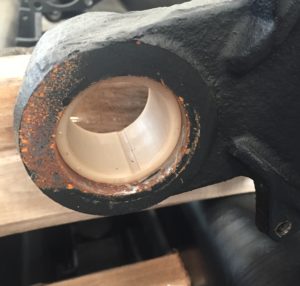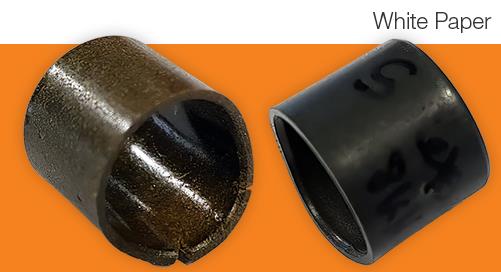How Does Moisture Affect Plain Bearings?
Plain bearings are often exposed to moisture. The effects of moisture are often underestimated. The result: bearing damage, the cause of which can often be misunderstood afterwards. If you know the mechanisms and effects of increased moisture in plain bearing applications, you can identify potential problems more easily and avoid them in advance by choosing the right material. So let's take a look at these.
How Does Moisture Affect Plain Bearings?
In the case of plain bearings made of metal, corrosion is of course primarily an issue. This problem does not apply to bearings made of plastic. But another factor comes into play here: the moisture absorption.
Plastics absorb—depending on the "type"—different amounts of moisture and at different speeds. You can think of it like a sponge that slowly soaks up water. The "max. Moisture absorption (at 23°C / 73°F, 50% r. F.)" is a test method according to DIN 53495 and provides information about the extent (i.e. the volume increase of the component) of the moisture absorbed from the air. The information in brackets describes the air temperature and humidity, whereas "max. Water absorption" means the change in volume due to moisture absorbed directly in contact with water. That means the bearing is submerged in water and taken out again after 24 hours.
You can easily avoid this problem in practice, either through design measures - i.e. defining the bearing play in such a way that the plain bearing can still expand sufficiently in the bearing position - or by choosing a plastic that absorbs less moisture.
In addition, ask yourself how and in what form the plain bearing is exposed to moisture. How long is the exposure time? How high is the humidity? In contrast to a sponge, plastic does not "absorb" immediately. Rather, components reach the first 5-10% of total saturation after a few minutes, the next 20% in a few hours. The next 50% in days. Can the component absorb the moisture in between, for example, give up the air? Then the plastic with higher moisture absorption will do the same.
Is Corrosion Protection Necessary for Plastic Plain Bearings?

Corroded mounting hole. Corrosion is not always easy to see.
I wrote above that corrosion is primarily an issue in metal plain bearings. Sure, plastic does not rust, but the bearing pin or the shaft can. Plastic plain bearings often run dry, so you don't need any lubrication. If this lubrication is omitted in contact with moisture, the plain bearing will not rust, but the shaft will (unless it is made of stainless steel or is coated accordingly). In addition, the mounting hole should also be protected from corrosion.
In summary, this is what you should keep in mind with plain bearings and moisture:
- Can the shaft, mounting hole and bearing be damaged by corrosion?
- How long is the warehouse exposed to moisture?
- Can the moisture be released again?
- Is the bearing clearance designed large enough?
Depending on these questions, you can either take appropriate countermeasures or choose a material with lower moisture absorption and additional corrosion protection.
Do you have problems with bearing damage as a result of excessive moisture or corrosion in your bearings? Contact an igus® expert. You can also visit our iglide® materials webpage to learn about our 17 most common plastic bearing materials, including those with low moisture absorption.



